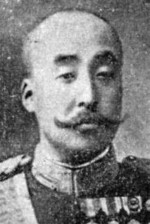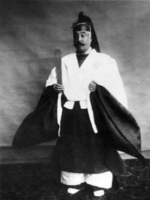Morimasa
| Given Name | Morimasa |
| House | Nashimoto |
| Born | 9 Mar 1874 |
| Died | 2 Jan 1951 |
| Country | Japan |
| Category | Military-Ground |
| Gender | Male |
Contributor: C. Peter Chen
ww2dbasePrince Tada was born in Kyoto, Japan as the fourth son of Prince Asahiko of Kuni and Mitsue Harada in 1874. In 1885, he was made the successor to the House of Nashimoto, a cadet branch of the imperial family. In 1886, he adopted the personal name Morimasa. In 1897, he married Itsuko Nabeshima, the second daughter of Marquis Naohiro Nabeshima; they would have two daughters together, Princess Masako and Princess Noriko. He attended the Central Military Preparatory School and the Japanese Army Academy. In 1899, he was made a second lieutenant and was assigned to the 39th Infantry Regiment. Between 1903 and 1904, he studied at the École Spéciale Militaire de Saint-Cyr at St. Cyr, France. Returning to the 39th Infantry Regiment for the Russo-Japanese War, he was promoted to the rank of captain and saw action. In Aug 1906, he returned to France, and remained there until Jul 1909. He was promoted to the rank of major in 1906, lieutenant colonel in 1908, colonel in 1910, and lieutenant general in command of the 16th Division in Aug 1917. In Nov 1919, he was made a member of the Army General Staff. In 1920, his daughter Princess Masako married Crown Prince Euimin Yi Un of Korea. In Aug 1922, he was promoted to the rank of general. In Aug 1932, he was made a field marshal. He held no major military command during the conflict with China in the 1930s, and was not involved with the February 26 Incident of 1936. In Oct 1937, he was made the chief priest of the Ise Grand Shrine in Ise, Mie Prefecture, Japan, upon the death of his half brother Prince Taka of Kuni. In the 1940s, through the expanded war, he continued to hold no major military commands. He retired from military service in 1944 at the age of 70. He served as president of the Imperial Association, the honorary president of the Franco-Japanese Society, the Japan Forestry Association, the Japan Agricultural Association, the Imperial Air Association, the Japan Martial Arts Association, and the Italian Society of Japan. In Dec 1945, for his role as the chief priest of Ise Grand Shrine, he was deemed a Class A war criminal by General Douglas MacArthur, and was arrested. Because he was the only member of the imperial family to be arrested for war crimes, some regarded this arrest MacArthur's subtle threat toward the Japanese Emperor, that the imperial family members could still be held accountable, and that the Emperor must be compliant with American-directed political reforms. Prince Morimasa was imprisoned at Sugamo Prison in Tokyo, Japan for four months, and then was released without any charges in Apr 1946. In Oct 1947, his princely title was abolished, and he became a commoner. Unlike other former members of the imperial family, however, he was explicitly denied any compensation for the loss of his title and properties. Having lost his Tokyo home from aerial bombing during the war, and having been forced to sell his country side home to pay taxes, he spent his final years in relative poverty. He passed away from a heart attack in Jan 1951. His widow, the former Princess Itsuko, adopted Norihiko, born in 1922 to Morimasa's half brother Prince Taka of Kuni, to carry on the Nashimoto name in 1966.
ww2dbaseSource: Wikipedia
Last Major Revision: Jun 2022
Morimasa Interactive Map
Photographs
 |  |  |  |
Morimasa Timeline
| 9 Mar 1874 | Prince Tada was born in Kyoto, Japan. |
| 2 Dec 1885 | Prince Tada was made the head of the Nashimoto Household. |
| 20 Nov 1897 | Prince Morimasa married Itsuko Nabeshima, daughter of Marquis Naohiro Nabeshima. |
| 4 Nov 1899 | Prince Morimasa's first daughter, Princess Masako, was born. |
| 20 May 1903 | Prince Morimasa was awarded Grade II, Class I of the Order of the Double Dragon of Qing Dynasty China. |
| 27 Apr 1907 | Prince Morimasa's second daughter, Princess Noriko, was born. |
| 22 Jul 1908 | Prince Morimasa was awarded Grand Cross of the Legion of Honour of France. |
| 7 Jun 1909 | Prince Morimasa was awarded Honorary Grand Cross of the Royal Victorian Order of United Kingdom. |
| 22 Jul 1909 | Prince Morimasa was awarded Grand Cross of the Order of Charles III of Spain. |
| 8 Aug 1932 | Prince Morimasa was made a field marshal. |
| 2 Dec 1945 | General Douglas MacArthur ordered the arrest of Prince Morimasa of Nashimoto for his support of Shintoism. |
| 13 Apr 1946 | Prince Morimasa was released from Sugamo Prison in Tokyo, Japan without charges. |
| 14 Oct 1947 | Morimasa's princely title was abolished. |
| 2 Jan 1951 | Morimasa passed away from a heart attack in Shibuya, Tokyo, Japan. |
| 28 Apr 1966 | Morimasa's widow Itsuko adopted his nephew Norihiko, born to Prince Taka of Kuni in 1922, in order to carry on the Nashimoto name. |
Did you enjoy this article or find this article helpful? If so, please consider supporting us on Patreon. Even $1 per month will go a long way! Thank you. Share this article with your friends: Stay updated with WW2DB: |
» Tokyo Trial and Other Trials Against Japan
- » 1,150 biographies
- » 337 events
- » 44,024 timeline entries
- » 1,241 ships
- » 350 aircraft models
- » 207 vehicle models
- » 375 weapon models
- » 123 historical documents
- » 260 facilities
- » 470 book reviews
- » 28,582 photos
- » 432 maps
Winston Churchill
Please consider supporting us on Patreon. Even $1 a month will go a long way. Thank you!
Or, please support us by purchasing some WW2DB merchandise at TeeSpring, Thank you!